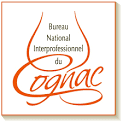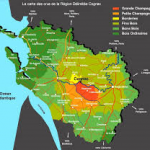The BNIC
During the war years the Cognaçais were required to provide the Germans with large quantities of brandy. They cheated of course by shipping spirits made from root vegetables thus maintaining their stocks of real cognac. It was during this period that Maurice Hennessy and a well known grower, Pierre Verneuil, followed the example of the growers in the Champagne  region and created the wine and eaux-de-vie distribution bureau to preserve the cognac stock. When the war ended this organisation emerged as the Bureau National Interprofessionnel du Cognac (BNIC), cognac’s governing body. Composed equally of growers and merchants, the BNIC acquired a great deal of de facto independence from the government in the formulation and supervision of the rules governing
region and created the wine and eaux-de-vie distribution bureau to preserve the cognac stock. When the war ended this organisation emerged as the Bureau National Interprofessionnel du Cognac (BNIC), cognac’s governing body. Composed equally of growers and merchants, the BNIC acquired a great deal of de facto independence from the government in the formulation and supervision of the rules governing cognac. The BNIC also took over the role, previously performed by Martell and Hennessy, of deciding the price of new brandies from various crus. The cognac region had been divided into crus in the 1930s as a natural consequence of the Appellation d’Origine Contrôlée system which had become law in 1905.
cognac. The BNIC also took over the role, previously performed by Martell and Hennessy, of deciding the price of new brandies from various crus. The cognac region had been divided into crus in the 1930s as a natural consequence of the Appellation d’Origine Contrôlée system which had become law in 1905.
The end of World War 2 also ushered in nearly 30 years of increasing prosperity. The BNIC greatly improved the relationship between growers and merchants and was lubricated by the ensuing prosperity. In 1948 the Station Viticole, a private laboratory set up to help growers and distillers after the Phylloxera outbreak, was taken over by the BNIC who were able to control all the stages involved in the production of cognac. This included the regulations required to manage the growing, wine making, distillation and ageing of cognac. More recently their powers have gone further with the control of market and sales information, both country by country and by product type, enabling them to manage government taxes and duties. In short, the BNIC now manages every stage of cognac production, from the vineyards to the end buyer.
